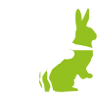Death in squirrels difficult to explain
It is difficult to say whether or not the number of squirrel deaths that is currently being seen in the Netherlands is normal. Since the zoogdiervereniging (Dutch organisation for protection and research of native mammals) called on the public to report any findings of dead squirrels, the level of awareness and possibly therefore the number of reports has increased; whether this is cause or effect is not clear. No evidence for poisoning has been seen in the squirrels submitted for post-mortem investigation at the Dutch Wildlife Health Centre (DWHC).
Of the almost 30 reports of dead squirrels, 15 have been submitted to the DWHC for post-mortem investigation.Several different causes of death and combinations of disease were observed: Seven of the squirrels had evidence of injuries consistent with collision with a vehicle. Some animals had pneumonia and others inflammation of the heart and liver, the cause of which is still under investigation. Several animals were infected with intestinal tape- or roundworms and infection with the single-celled parasite Eimeria (coccidiosis) was also seen.
Public asked to keep reporting dead squirrels
To better understand these squirrel deaths it is important that the public stay vigilant and keep reporting dead squirrels to the DHWC. Cadavers found at the roadside that appear to be victims of collisions with vehicles are not always suitable for post-mortem investigation but should be reported to www.zoogdiergezien.nl..
Why squirrels, why now?
The finding of several dead squirrels in the Dutch town of Twente alerted the Zoogdiervereniging and DWHC to a possible increase in the number of squirrel deaths and prompted a call on the public to report all findings of dead squirrels. This resulted in a large number of reports, the majority from Twente in the province of Overijssel, followed by multiple reports from Drenthe, Gelderland and North Brabant, and single reports from Friesland, Utrecht en North-Holland.
DWHC
The mission of the Dutch Wildlife Health Centre is the collection and analysis of data relating to the health status of Dutch wildlife and the sharing of this knowledge with relevant parties in the areas of public health, agriculture and economics.
More information
For more information please contact Marieke Veldman, department of Communicatie & Marketing of the University of Utrecht Vet School, (030) 253 3430, m.m.veldman@uu.nl.



